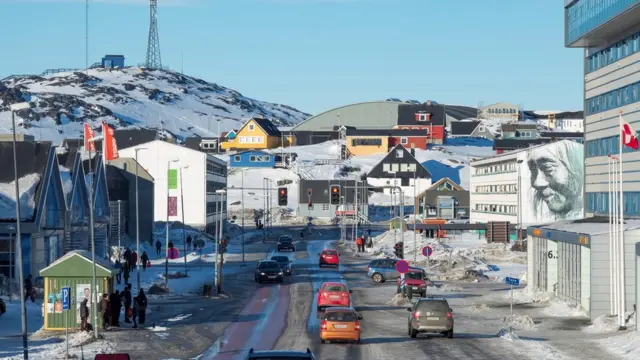The U.S. president reaffirms strategic interest in the territory, citing national security issues and natural resources as justifications for its annexation.
The European Union’s High Representative for Foreign Affairs, Kaja Kallas, categorically denied any possibility of negotiations involving Greenland, an autonomous region under the sovereignty of Denmark, on Monday (27). The statement came after comments from U.S. President Donald Trump, who suggested that the territory should be controlled by the U.S., citing national security reasons and strategic interests in the Arctic.
“We are not negotiating on Greenland. Of course, we support our member state, Denmark, and its autonomous region, Greenland. But we should not engage in speculation about hypothetical scenarios that do not reflect the current reality,” Kallas stated in a press conference in Brussels, following the meeting of the European Union’s foreign ministers.

Greenland, the world’s largest island, has held autonomous status since 1979, with significant powers over its governance, although defense and foreign policy remain under Denmark’s responsibility. Recently, both the Danish government and Greenlandic authorities reaffirmed that the island is not for sale, rejecting Trump’s statements.
Greenland’s Prime Minister, Mute Egede, emphasized the importance of respecting the right to self-determination of Greenlanders:
“The fate of Greenland belongs to the people of Greenland, and only them. Our decisions should be made based on our interests and sovereignty, not external pressures. Greenland is not for sale, now or ever.”
Meanwhile, the Danish government, led by Prime Minister Mette Frederiksen, labeled Trump’s statements as absurd, reiterating its commitment to Greenland’s autonomy. Frederiksen had previously stated in interviews that “Greenland is not a product for sale, but rather the home of a proud and independent people.”
Donald Trump’s remarks are not new. During his first presidency, he caused controversy by publicly suggesting that the United States should buy Greenland, a proposal that was widely ridiculed but is now being taken more seriously. In his view, the territory is essential for ensuring U.S. national security and strengthening the U.S. presence in the Arctic.
In a recent press conference at Mar-a-Lago, Trump declared:
“We need Greenland for national security purposes. Its strategic location in the Arctic is indispensable for protecting our interests and monitoring activities of rival powers. If Denmark has any claim over Greenland, they should give it up because the United States needs it now more than ever.”
Beyond strategic issues, Trump also sees Greenland’s economic potential as a central justification. The island holds vast natural resource reserves, including rare earth metals, which are essential for producing modern technologies like batteries, electronic devices, and military equipment. As global warming accelerates the melting of glaciers, access to these resources is becoming more viable, increasing economic and geopolitical interest in the territory.
Greenland occupies a strategic position in the Arctic, making it a focal point in growing geopolitical disputes. Its location allows for monitoring activities in the North Atlantic and the North Pole, areas of increasing militarization, especially by Russia, which has been expanding its military and economic presence in the region.
Furthermore, the Arctic is considered an emerging frontier for natural resource exploration, and Greenland is viewed as a central piece in this context. The island hosts large deposits of oil, natural gas, and minerals, including rare earth metals, whose demand is rapidly increasing due to the transition to green and digital technologies.
Another critical point is the impact of climate change in the region. The melting of Greenland’s ice sheets is not only exposing previously inaccessible resources but also playing a crucial role in rising sea levels, making the region central to global discussions on global warming and sustainability.
Trump’s proposal has reignited debates about the legitimacy of any potential attempt to acquire Greenland and how this would be received on the international stage. Experts argue that any move in this direction would violate fundamental principles of international law, including respect for the self-determination of peoples.
For the European Union, this issue also involves the protection of its member states and associated territories. Kaja Kallas’ statement clearly indicates that the EU is aligned with Denmark and committed to Greenland’s sovereignty. “This is not just a regional issue; it concerns fundamental principles of governance, sovereignty, and respect for international law,” said a European diplomat who attended the meeting.
Greenland is just one piece in a larger geopolitical puzzle. The Arctic, with its vast wealth of resources and strategic location, is increasingly at the center of attention for global powers like the United States, Russia, and China. The militarization of the region and the growing competition for more accessible maritime routes due to the melting ice are clear signs that the Arctic will be the site of intense disputes in the coming years.
In this context, Trump’s attempt to bring Greenland into the American sphere of influence is seen as an effort to secure a strategic advantage in the region, amid rising tensions between the world’s major powers.
Although it currently rejects any proposals for sale or annexation, Greenland faces significant challenges regarding its autonomy and economic development. The territory still relies heavily on subsidies from Denmark and seeks to explore its natural resources sustainably to ensure its economic independence.
The discussion about Greenland’s future, therefore, goes beyond Trump’s statements, involving complex issues of geopolitics, sustainability, and cultural identity. For the Greenlandic people, the challenge is balancing external interests with their desire to ensure a future that respects their history, rights, and autonomy.

